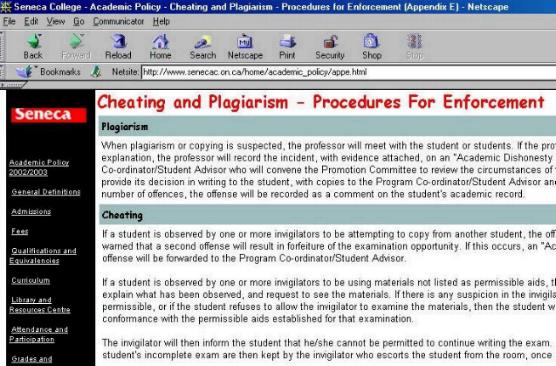| SENECA COLLEGE, TORONTO | |
| www.witiger.com/senecacollege/FCA240~2002.htm | |
| As Taught by Prof. Tim Richardson School of Marketing and e-Business, Faculty of Business |
| Section 1 | Section 2 | Section 3 | Section 4 | Section 5 | Section 6 |
| Chpt
4
E-commerce and the role of Third Parties o Verisgn o TRUSTe Chpt
5
Privacy
Issues in Canada
web linking
search engines Domain Name System
domain name disputes
Patents on the WWW Guest Speaker
|
Chpt
7 main text
+ Chpt 2 Information Security text Risks of Insecure Systems Internal Threats Risks with Business Partners Types of attacks
Data Interception |
Internet Security
Standards RSA Security SANS Institute Chpt
8
Security Policies
Security Processes .compartmentalize .secure weak link .use choke points .defense in depth .enlist users .detect attacks IT Security Audit Organizational Liability |
Mar 19 Guest
Speaker
Mr. John Florinis powerpoint Scotiabank Chpt 10 Cryptography and Authentification Cryptography Video Identification and Authentification .Confidentiality .Integrity .Authentification .Non-repudiation Access Controls Encryption
Key Management
Public Key
Digital Signatures
email security . PGP . PEM Wireless security RSA & Wireless |
Chpt
11
Firewalls Firewall Unit Components of a
Functionality Securing the
Firewall Limitations Intrusion Investigation Chpt
12
Chpt
14
|
This
section is additional supplementary
material Industry Associations Gov't response
National Government Involvement in internet crime and e-business security CSIS
The Nigerian Scam
Professional
|
| Jan 8th
Jan 15th Jan 22nd |
Jan
27 guest speaker
Jan 29 Assg #1 due Feb 5 Quiz # 1 Feb 5 Hacking Video Feb 12 |
Feb 19.
Feb 19 Assg #2 due Feb 26 no class -break week Mar 5 no class / snow Mar 12 Guest Speaker Mr. Sean Rooney www.coldstream.ca |
Mar 19 Guest
Speaker
Mr. John Florinis powerpoint Scotiabank Mar 26 Quiz # 2 Mar 26 Assg #3 due |
Apr 2 M-Choice
Quiz # 3
Apr 9 Apr 16 Assg #4 due |
. |
| Every Student should read
Seneca's policy on Cheating and Plagiarism.
Cheating and Plagiarism are serious offences.  |
If you are caught cheating
you might receive "0" on the exam, or project, or, you could fail the course.
In some cases for serious cheating offences, students have been kicked
out of the college.
Most students understand
cheating. Plagarism is more subtle, but also a serious offence.
Prof.
Richardson wishes to remind you that If you "cut and paste" phrases and
sentances off the Internet, without using ".", or without saying what URL
it came from, this is considered plagarism. If you copy work from another
student's website, and submit this for grading, it is also considered cheating,
unless you have permission, and say what site it came from.
|